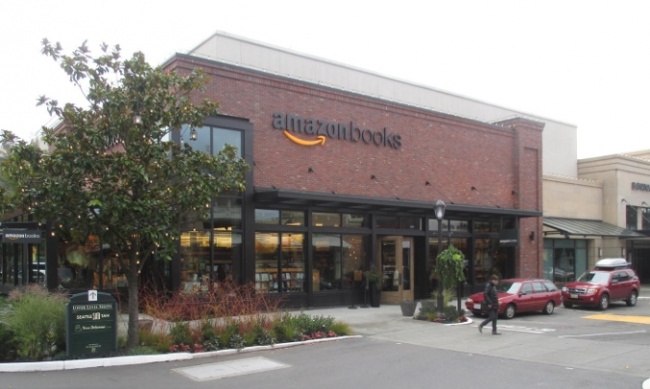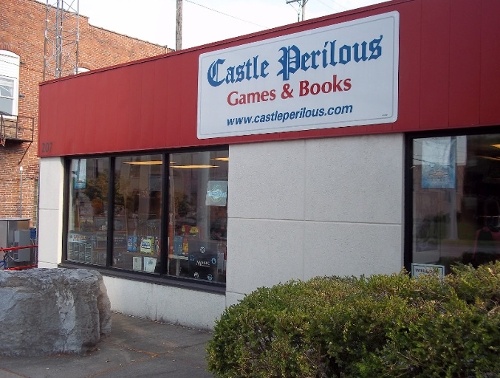Rolling for Initiative is a weekly column by Scott Thorne, PhD, owner of Castle Perilous Games & Books in Carbondale, Illinois and instructor in marketing at Southeast Missouri State University. This week, Thorne believes that brick and mortar retailing still has a long future ahead of it, but just hopes it is not an all-Amazon future.
I’ve been covering retailing in my Principles of Marketing class this past week. Actually I’ve been covering it for an entire semester in the Retail Marketing class but in Principles I try to condense the concepts of running a retail operation into three hours of lecture plus homework, as well as indicate just how important retailing is to the economy and to their future careers. Sadly, I do not appear to do a very good job of making the point as a goodly number of the students in the Retail Marketing class tend to skip it if they do not think I will make an assignment. One would think they would find a little more interest in the aspect of business that drives the economy and provides more jobs than any other sector. Maybe they feel that retailing starts and ends behind a cash register at Walmart. Of course, it does not, and, if you are reading this, you know that as well.
However, one of their perceptions regarding retailing proved quite interesting in my discussion with them across three different marketing classes and that was their perception regarding how much retailing is conducted online. When I asked how many had made a recent purchase online, nearly every hand in the classrooms shot up, with most of them having made an online purchase over the preceding weekend. Ergo, I should not have been surprised when I asked them what percentage of retailing was done online, the percentages ranged from a high of 80% to a low of 15%. None of them went as low as the actual figure of 11-12% and most were quite surprised when I told them that, until I pointed out that we have not figured out a way to send gasoline through the internet yet.
Though things like books and music and movies can quickly come online, there are still plenty of items that still need to be purchased in a brick and mortar location. However, this is an area into which the largest internet retailer, Amazon, as well as other pure play internet retailers such as Warby Parker and Bonobos, are moving as they see opening physical locations (or "Guideshops" as Bonobos refers to them) as a way to get closer to the customer. Customers cannot even buy physical products in Bonobos’ Guideshops. The customer tries on shirts, slacks and shoes, finds a perfect fit and look, then Bonobos delivers the customer’s selections in one to two business days.
Meanwhile, Amazon is opening physical bookstores (see "ICv2 Visits the Amazon Brick and Mortar Store"), but without a marked price, aside from MSRP, on the books. Customers scan the books and pay whatever the current market price Amazon has on the book, with differing prices for Prime and non-Prime members. Me, I see the bookstore operation as a cunning strategy to get more customers to sign up for Prime when they see how much they could save.
Amazon has also opened unstaffed stores called Amazon Go, in which customers are scanned by a battery of cameras and sensors that determine what items the customer takes from the shelves and charges their Amazon account for it. Convenient and yet another way to encourage customers to sign up for an Amazon account, while gathering more info about them.
Based on this, brick and mortar retailing still has a long future ahead of it. I just hope it is not an all-Amazon future.
The opinions expressed in this column are solely those of the writer, and do not necessarily reflect the views of the editorial staff of ICv2.com.

Column by Scott Thorne
Posted by Scott Thorne on November 13, 2017 @ 1:33 am CT
MORE GAMES
Inside and Outside the Con
August 7, 2025
Cosplayers and re-enactors showed off their talents both inside and outside the convention center.
From Arcane Tinmen
August 7, 2025
Arcane Tinmen will release Dragon Shield: Halloween accessories into U.S. retail.
MORE COLUMNS
Column by Jeffrey Dohm-Sanchez
August 7, 2025
ICv2 Managing Editor Jeffrey Dohm-Sanchez lays out the hotness of Gen Con 2025.
Column by Rob Salkowitz
August 5, 2025
In this week's column by Rob Salkowitz, he looks at the industry's biggest show, held in the midst of some existential issues.








